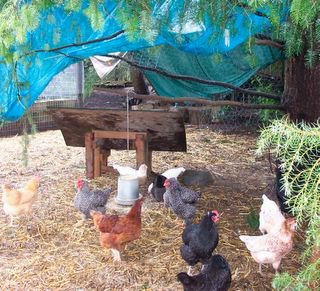
We live in what is referred to as the temperate rainforest--our version of winter is rain, rain, and then for some added variety, lighter or heavier rain. Domesticated chickens are not noted for their love of moist conditions. In fact, I have to ascend the soap box briefly here--please folks, don't force ducks and chickens to live together. It can produce ill health in both, since ducks like the moisty muddy and are carriers of illnesses that can kill chickens (such as the current strain of avaian flu that is notably decimating chicken flocks only in areas of Asia where ducks and chickens are being reared together!) and chickens need dryer conditions where they can scratch around, consume gravel, and have dust baths. We have seen folks successfully rear ducks and hens where there is ample separate environments created to meet the needs of these different fowl.
We've attempted to provide our hens with adequate dry zones for our rainy Willamette Valley winters. You'll notice directly over the feeder there is a tarp hanging from the fir tree, and behind the feeder is a less than attractive wood lean to--this keeps the feed dry, even if there is wind. (Chickens can become very ill from wet feed.) As part of our regular chicken care, we do have to periodically poke the tarps to empty the "pooling" zones that create, otherwise the tarps would eventually be ripped from the tree tops by the accumulated water weight.
What appears to be the backside of the feed covering tarp, is actually about 20 yards away--that is a much larger tarp (perhaps 25' X 25"), also suspended from a fir. This provides a large enough area during heavy rain that, even with pecking order rivalry, all the hens can have adequate dry shelter. We've also put a composting/mulch zone for worm forage, and the hens have created their own spa zone--you guessed it, dust baths! They seem much happier and healther for it this winter, since last winter they didn't have a nice dusting area.
We've also found it important to cover the ground with straw to prevent a mud bog from developing. The chickens seem to appreciate this, since unlike ducks, their feet are not well suited for traction on mud. They enjoy picking out the seeds, but that's a fringe benefit.


No comments:
Post a Comment